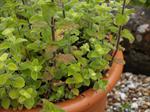
Herbs are relatively pest and disease-free, in fact, they are often best used as companion plants to repel insects from more susceptible species.
There are few pests or diseases that generally affect herbs however some plants are prone to specific pests or diseases. For example, rust attacks mint and greenfly infests parsley during dry conditions.
The best means of minimising damage to your plants is to do a regular check on their condition. As soon as pest and disease problems become apparent, they should be treated. If infestations are caught early enough they can often be easily removed by hand. Insects can simply be plucked off your plant and either crushed, drowned or disposed of in some other way. Damaged leaves or stems from fungal attack can be easily removed and then burnt. You must be careful however and wash your hands after handling such material so you don’t inadvertently spread fungal spores to other plants when checking them. When damping-off (seedlings rotting at the base) occurs, improve ventilation by increasing the space between your plantings and replace your soil with a lighter more open one.
Natural predators should also be encouraged in your garden, particularly birds. Parasitic bacteria that attack only moths and caterpillars can be purchased as a spray known as Dipel. Parasitic spider mites that attack and control red spider can be purchased from specialist suppliers.
If problems are too large to cope with by hand, then you may have to use one of the “safe” sprays that are available. Many of these sprays are based on naturally occurring plant products such as garlic, pyrethrum and eucalyptus. Other safe sprays include products based on liquid soaps, such as Clensel or on mineral oils, such as white oil. Sodium bicarbonate, a common cooking ingredient, has been found to protect beans, cucumbers and muskmelons from fungi – but you need to use it as a preventative (before any signs of fungal disease occur). It may be worth trying on herbs that suffer from fungal attack. A spray consisting of one part well-decomposed compost and six parts water that has been allowed to stand for a week and then filtered, has worked well against blights, anthracnose and some mildews in German university trials.
Birds are one of nature’s greatest means of keeping insects under control. A garden which encourages birdlife will also encourage nature to keep pests under control. Birds will enter and live in a garden which provides them with the right environment: places where they can perch, where they can drink, eat and nest, and where they can escape from predators such as cats. Ponds and pools are always and encouragement for birds as are well designed bird boxes or feeders.